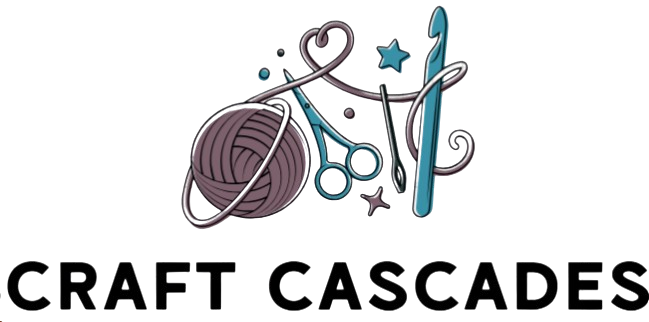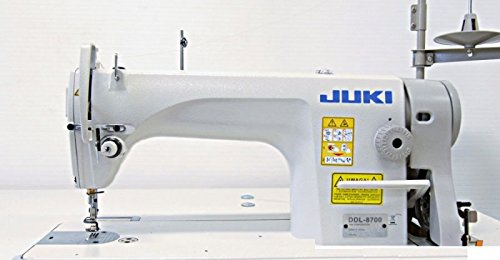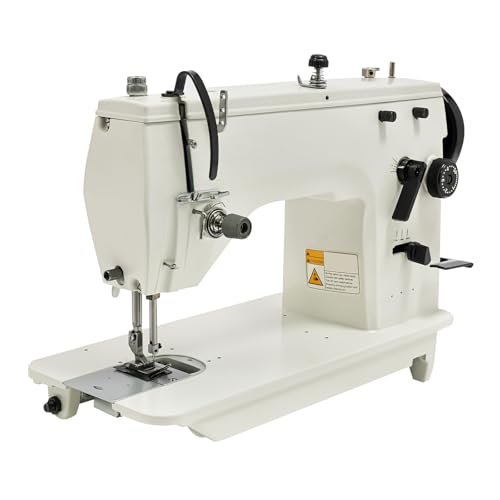Did you know that industrial leather sewing machines can pierce through materials up to 10mm thick—that’s about twenty layers of standard denim? If you’re working with leather, you’ll need equipment that won’t buckle under pressure. The difference between a consumer-grade machine and a true industrial powerhouse isn’t just about speed; it’s about whether your next project survives or becomes an expensive pile of mangled hide. Let’s examine what separates the contenders from the pretenders.
JUKI DDL8700H High-Speed Lock-Stitch Sewing Machine (DDL-8700H)
The JUKI DDL8700H proves itself as the powerhouse choice for professionals who regularly tackle heavy-duty materials like leather, canvas, and denim. This head-only machine reaches impressive speeds up to 4,000 RPM while maintaining consistent stitch quality through its 3-row feed dog system. You’ll appreciate the adjustable presser foot lift ranging from 5.5 to 13 mm, accommodating varying material thicknesses effortlessly. The machine accepts DB×1 needles in sizes #19 through #23, providing flexibility for different leather weights. With a maximum stitch length of 5 mm, you’ll complete projects efficiently. Essential accessories include a thread stand, bobbin winder, oil pan, and knee lifter for ideal operation.
Best For: Professional sewers and industrial users who regularly work with heavy-duty materials like leather, denim, canvas, and thick upholstery fabrics and need a high-speed, reliable machine for demanding projects.
Pros:
- Exceptional high-speed performance at up to 4,000 RPM enables fast completion of large-scale projects while maintaining consistent stitch quality
- Versatile presser foot lift (5.5-13mm) and compatibility with multiple needle sizes (#19-#23) allows seamless transitions between different material thicknesses
- Robust 3-row feed dog system provides reliable fabric feeding for heavy materials like leather, boat canvas, and professional curtains
Cons:
- Head-only configuration requires separate purchase of table and motor, increasing initial setup costs and complexity
- Not a walking foot machine, which may limit performance on extremely thick or multiple-layer leather projects compared to specialized walking foot models
- Requires regular maintenance including oiling and adjustments, demanding more technical knowledge than typical home sewing machines
SINGER Heavy Duty 500 Classic Sewing Machine with Accessory Kit
Sewers who regularly work with thick materials like denim, canvas, and lighter leather will find the SINGER Heavy Duty 500 Classic an ideal companion for their projects. Its motor delivers 50% more power than standard models, while the full metal frame guarantees stability during high-speed operation. You’ll appreciate the 23 built-in stitches and 1-step buttonhole feature for versatile applications. The built-in needle threader reduces eye strain, and the drop feed function enables free-motion quilting. Your purchase includes essential accessories: five presser feet, four bobbins, and cleaning tools. The 25-year limited warranty demonstrates SINGER’s confidence in this machine’s durability.
Best For: Sewers who regularly work with heavy-duty fabrics like denim, canvas, and lighter leather and need a powerful, durable machine with vintage aesthetics and modern features.
Pros:
- 50% more powerful motor than standard models with full metal frame construction for stability when sewing thick, heavy fabrics at high speeds
- 23 built-in stitches with 1-step buttonhole, built-in needle threader, and drop feed function provide versatility for decorative sewing, free-motion quilting, and various techniques
- Comprehensive accessory kit with five presser feet, four bobbins, cleaning tools, and 25-year limited warranty demonstrating long-term durability
Cons:
- At 13.67 pounds, the machine may be less portable than lighter models for sewers who need to transport it frequently
- Limited to 23 built-in stitches, which may not satisfy advanced sewers looking for extensive stitch variety and customization options
- Vintage-inspired design, while aesthetically appealing to some, may not suit modern workspace preferences or décor styles
SINGER Heavy Duty 4452 High Speed Sewing Machine with Accessory Kit
Hobbyists and intermediate sewers who need versatility without industrial pricing will find the SINGER Heavy Duty 4452 an ideal entry point for leather projects. Its strong motor handles thick materials, though it’ll struggle with multiple leather layers. You’ll appreciate the 110 stitch applications and metal frame construction that provides necessary stability. The built-in needle threader and LED lighting streamline your workflow, while six included presser feet expand your capabilities. However, expect noise during operation and some difficulty changing presser feet. With 11,684 customer reviews averaging 4.4 stars, it’s proven reliable for lighter leather work, but seasoned professionals should consider more robust industrial options.
Best For: Hobbyists and intermediate sewers seeking a versatile, budget-friendly machine for light to medium leather projects and heavy-duty fabrics without requiring industrial-grade performance.
Pros:
- Strong motor with enhanced piercing power handles thick materials and comes with 110 stitch applications including decorative stitches and 1-step buttonhole
- Full metal frame construction provides excellent stability and durability, backed by 4.4-star rating from over 11,000 customers
- Comprehensive accessory kit includes six presser feet (including non-stick and walking foot), built-in needle threader, and LED lighting for improved workflow
Cons:
- Struggles with multiple layers of thick materials like leather and has limited performance with zig-zag stitching on heavy fabrics
- Difficult to clean and change presser feet, with some users reporting challenges with quilting guide attachments and presser foot adjustments
- Noisy operation during use, which may be disruptive for some work environments
6500RPM Industrial Sewing Machine with Motor, 550W Heavy Duty
Professional seamstresses and tailors working with heavy-duty materials will find exceptional value in this 6500RPM industrial sewing machine, which combines a powerful 550W pure copper motor with remarkable speed control ranging from 200 to 6500 RPM. You’ll appreciate its ability to handle materials up to 0.2 inches thick, from delicate chiffon to heavy canvas and leather. The adjustable stitch length (0-5mm) provides versatility for various projects, while the reversing rod enables easy backstitch reinforcement. At just 30dB, it operates remarkably quietly for an industrial machine. The foot pedal features anti-slip protection, and the thread gripper prevents frustrating thread breakage during demanding sewing tasks.
Best For: Professional seamstresses, tailors, alteration stores, and serious DIY enthusiasts who regularly work with heavy-duty materials like leather, canvas, denim, and upholstery fabrics requiring industrial-grade performance.
Pros:
- Powerful 550W pure copper motor delivers impressive speed range (200-6500 RPM) with up to 3500 stitches per minute for high productivity on demanding projects
- Handles thick materials up to 0.2 inches including leather, canvas, and multiple layers of heavy fabric with adjustable stitch length control (0-5mm)
- Remarkably quiet operation at approximately 30dB with thoughtful features like anti-slip foot pedal, thread gripper to prevent breakage, and temperature-reducing handwheel design for motor longevity
Cons:
- Heavy weight of 67 lbs makes it difficult to move or transport, limiting portability for those who need flexibility in workspace setup
- Limited to single needle operation with only 14# needle size, which may not provide the versatility needed for specialized sewing techniques or varying thread weights
- Requires assembly upon arrival and lacks detailed information about warranty coverage or customer support responsiveness for troubleshooting issues
Industrial Straight Stitch Sewing Machine Heavy Duty with Adjustable Stitch Clamp
The Industrial Straight Stitch Sewing Machine Heavy Duty with Adjustable Stitch Clamp excels at handling thick leather materials up to 4mm, making it the best choice for anyone who regularly works with heavy-duty fabrics and needs reliable, consistent stitching. You’ll appreciate its cast iron construction with spray-finish coating that resists wear and deformation. The adjustable gauge (1-5) and customizable bottom thread tension give you precise control over your stitches. You can easily switch sewing directions with reverse functionality, while the manual presser foot spanner simplifies thread clamping. Its compact 15.7 x 7.1 x 11.4-inch design fits well in both professional garment factories and home workshops.
Best For: Garment factory workers and home sewing enthusiasts who need to sew heavy-duty fabrics up to 4mm thick with precise stitch control and reliable durability.
Pros:
- Durable cast iron construction with spray-finish coating resists wear and deformation for long-lasting performance
- Adjustable gauge (1-5) and customizable bottom thread tension provide precise control over stitch quality
- Reverse stitch functionality and manual presser foot spanner offer versatile sewing direction and easy thread clamping
Cons:
- Limited to straight stitch only with minimal zig-zag width (0-0.354 inches) which restricts decorative stitching options
- Requires manual handwheel operation for needle movement rather than automated motor control
- Compact dimensions may limit workspace for handling larger fabric projects
Leather Patcher Sewing Machine, 500 Stitches Shoe Repair Machine
When you need a reliable workhorse for repairing heavy-duty leather goods and footwear, this Leather Patcher Sewing Machine delivers 500 stitches per minute through thick materials that would challenge lighter equipment. Its cast iron construction provides exceptional durability at 61.7 pounds, while the 11.81-inch long arm reaches tight spaces effortlessly. You’ll appreciate the adjustable stitch length (5-15 stitches per inch) and two-speed pulley system for precise control. The dual needle hole sizes and adjustable thread tension accommodate various materials—from leather and rubber to canvas and nylon. This machine handles shoes, boots, bags, and cylindrical objects with parallel needles that create stronger seams than single-head alternatives.
Best For: Home users and professional cobblers who need to repair heavy-duty leather goods, shoes, boots, and bags with thick materials requiring industrial-strength stitching capabilities.
Pros:
- High-speed operation at 500 stitches per minute with cast iron construction ensures durability and efficient handling of thick materials like leather, rubber, and canvas
- Extended 11.81-inch long arm design easily reaches tight spots and cylindrical objects without awkward fabric manipulation
- Versatile adjustability features including dual needle hole sizes, adjustable stitch length (5-15 stitches per inch), and two-speed pulley system for precision control across different materials
Cons:
- Heavy weight of 61.7 pounds makes the machine difficult to move or transport for portable repair work
- Manual and electric combination operation may require a learning curve for users accustomed to fully automatic sewing machines
- Limited to specific heavy-duty repair tasks and may not be suitable for delicate fabrics or general-purpose sewing projects
Industrial Leather Sewing Machine, Heavy Duty Hand Crank (500spm)
Hand crank operation sets the DSHUENVRL SM-2972 apart as the best choice for craftspeople who need precise control when working with thick leather and heavy materials. This 66.1-pound cast iron machine delivers 500 stitches per minute while maintaining quiet operation. You’ll appreciate the 360-degree rotating presser foot that adjusts sewing routes for cylindrical objects like boots and bags. It handles multiple layers of leather, rubber, canvas, and nylon without jamming. Customers rate it 5.0 stars for its reliability in shoe repair and leatherwork. The durable construction guarantees long-term performance for cobblers and DIY enthusiasts tackling demanding projects.
Best For: Cobblers, leatherworkers, and DIY enthusiasts who need precise manual control for sewing and repairing thick materials like leather, canvas, and rubber.
Pros:
- Hand crank operation provides exceptional precision and control for working with heavy-duty materials and multiple layers
- 360-degree rotating presser foot allows for versatile sewing routes, ideal for cylindrical objects like boots and bags
- Durable cast iron construction (66.1 lbs) ensures stability and long-term reliability with quiet operation
Cons:
- Manual hand crank operation limits speed to 500 SPM compared to motorized industrial machines
- Heavy weight of 66.1 pounds makes the machine difficult to move or relocate
- Limited customer review data with only 3 ratings available to assess long-term performance
Factors to Consider When Choosing an Industrial Sewing Machine for Leather
When you’re selecting an industrial sewing machine for leather work, you’ll need to evaluate several critical specifications that directly impact your machine’s performance and longevity. The motor’s power and speed capabilities determine what thickness of leather you can handle, while features like stitch length adjustment, presser foot lift height, and needle compatibility affect your project versatility. You should also examine the frame’s construction quality, as it guarantees your machine withstands the demanding nature of leather fabrication.
Motor Power and Speed
Since leather’s density and thickness demand consistent power throughout the stitching process, you’ll need to prioritize motor strength when selecting your industrial sewing machine. Look for motors rated at 550W or higher to prevent stalling when working with dense materials and multiple layers.
High-speed capability matters greatly—machines offering 3500-6500 stitches per minute boost productivity in industrial applications. However, raw speed isn’t everything. You’ll want adjustable motor speed controls for precise stitching on varying material thicknesses, giving you flexibility when shifting between heavy leather and delicate sections.
A quality motor also reduces operational noise, creating a better working environment. Invest in machines with durable motor mechanisms to guarantee longevity and maintain consistent performance throughout demanding projects.
Stitch Length Adjustment Range
Leather projects demand versatile stitch length control to match material thickness and project requirements. You’ll want a machine offering adjustments from 0 to 5mm, providing the flexibility needed for various leather types and upholstery work. This range lets you select longer stitches for heavy materials, which increases sewing speed and reduces needle breakage risks.
Precise stitch length control guarantees consistent, strong seams that won’t unravel—critical for quality leatherwork. You’ll achieve better seam integrity and professional appearance when you can customize stitches for each project’s specific demands.
Adjustable stitch length also enables versatility in your techniques, whether you’re creating decorative elements or functional seams. This feature accommodates everything from delicate leather detailing to heavy-duty construction, making your machine adaptable to diverse leather crafting needs.
Presser Foot Lift Height
Though often overlooked, presser foot lift height directly determines whether you’ll successfully handle thick leather layers or struggle with material insertion. You’ll need at least 5.5 mm of clearance to comfortably work with heavy fabrics and multiple layers. Machines offering adjustable presser foot lifts give you flexibility across varying leather thicknesses, making them invaluable for diverse projects.
A higher lift height facilitates seamless changes between different leather weights, preventing the bunching and feeding issues that plague lower-end machines. This seemingly minor specification dramatically affects your stitch quality consistency and overall efficiency when working with bulky items. Don’t compromise here—inadequate lift height will create constant frustration, forcing you to wrestle materials into position rather than focusing on precision work.
Needle Compatibility and Strength
Beyond securing proper clearance for your materials, you’ll need the right needle system to actually pierce through leather‘s dense fibers. Look for machines compatible with needles ranging from #14 to #23, matching the size to your leather’s thickness. Needle types like DB×1 or DP×5 are vital for penetrating thick materials without damage.
Prioritize needles with wedge-shaped points designed specifically for leather—they’ll reduce thread breakage and skip fewer stitches. Heavier-duty industrial needles are important when working with thick leather or multiple layers, as standard needles will bend or break under pressure.
Don’t overlook needle maintenance. Replace worn needles regularly, since dull points cause skipped stitches and compromise seam quality. Your machine’s strength means nothing if you’re using inadequate needles.
Frame Construction and Durability
When you’re investing in an industrial leather sewing machine, the frame’s construction will determine whether your equipment lasts a decade or fails within months. Look for high-quality cast iron construction that resists wear and deformation under continuous use. A full metal frame design is essential—it’ll minimize vibration during high-speed operations and dramatically improve your stitching precision.
Weight matters more than you’d think. Machines exceeding 60 pounds offer superior stability when you’re working with thick leather materials. This heft keeps everything steady, even when powering through multiple layers of heavy fabric.
Robust build quality isn’t just about durability; it’s about maintaining peak performance throughout years of professional use. Enhanced construction materials protect your investment and guarantee consistent results.
Maximum Fabric Thickness Capacity
Understanding your material requirements will save you from costly purchasing mistakes. Industrial sewing machines for leather typically handle thicknesses ranging from 4mm to over 10mm, depending on their specifications. You’ll find heavy-duty models capable of sewing through multiple layers up to 0.2 inches (approximately 5mm) thick, including leather, rubber, and canvas combinations.
Your machine’s needle compatibility directly impacts its performance on thicker materials. You’ll need to verify that recommended needle types match your fabric weight requirements. An adjustable presser foot is essential for managing varying material thicknesses, ensuring consistent feeding while preventing leather damage.
Don’t overlook motor power—higher wattage motors provide the strength needed to penetrate dense materials without thread breakage or jamming. Match the machine’s maximum capacity to your specific project requirements.








